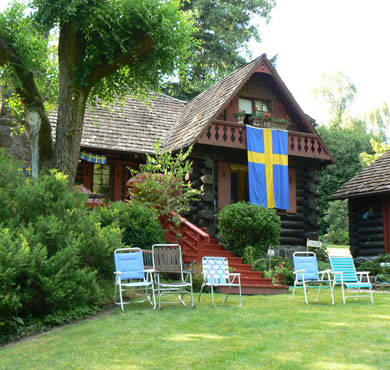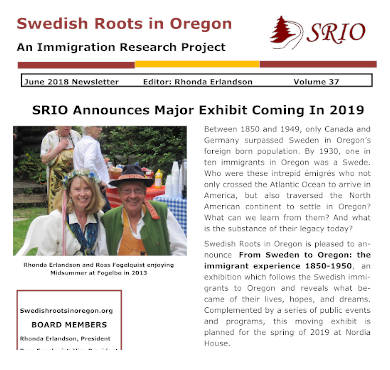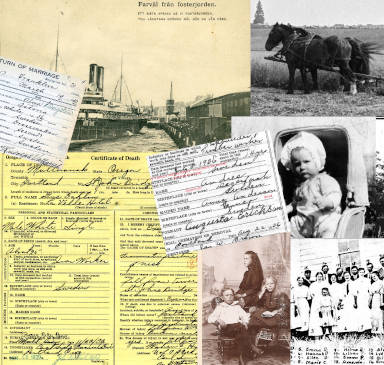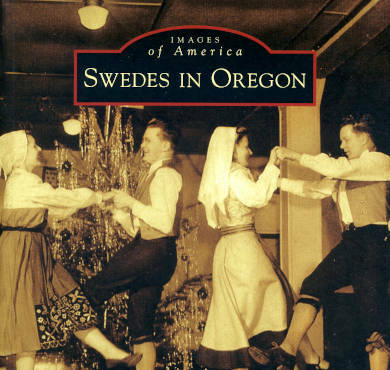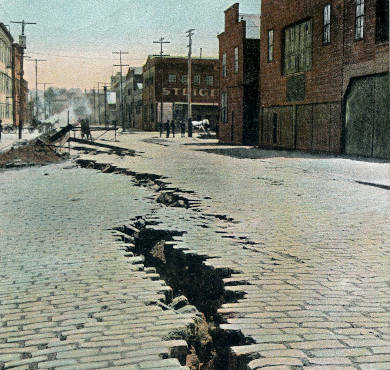During the summer of 1914, the year before he moved to Oregon, Samuel Magnus Hill started spending a great deal of time in front of his Swedish typewriter. He typed up a large stack of old letters to and from relatives and friends in Sweden and the United States, and he cleaned up the diary he had kept during the family’s emigration in 1868
Introduction To Hill’s Diary
More often than not, early Swedish immigrants to Oregon did not come directly from Sweden, but moved west after having lived in other states for many years. Many seemed to have been attracted by the milder climate and relocated from the Midwest. This was the case for Samuel Magnus Hill (1851 – 1921), who had arrived in the United States with his family as early as 1868, but who did not settle in Oregon until 1915. Before arriving, Hill had spent most of his adult life at the Swedish-speaking Luther College in Wahoo, Nebraska. In the late spring of 1901, during his first and only trip back to his native country, Hill had made an unsuccessful attempt to find a job in Sweden and relocate his family. Then, following his 1914 retirement from Luther College, Hill instead moved west to Oregon where he became the minister in a small Swedish settlement colony called Carlsborg.
During the summer of 1914, the year before he moved to Oregon, Samuel Magnus Hill started spending a great deal of time in front of his Swedish typewriter. He typed up a large stack of old letters to and from relatives and friends in Sweden and the United States, and he cleaned up the diary he had kept during the family’s emigration in 1868. Hill also made a typescript of his journal from the 1901 trip to Sweden, and he typed up many of his poems and songs. In addition, Hill composed two memoirs. The first he entitled: Biografi: Eller hvad jag minnes ur mitt lifs historia [Biography: Or what I remember of my life’s history], and it contains recollections from his life in Sweden prior to the family’s emigration. The second he entitled Andra afdelningen. Hvad jag minnes om mit lif i Amerika [Part Two. What I remember of my life in America]. None of these approximately 400 manuscript pages (all of which were written in Swedish) have been published before, even though some of the material in “Part Two” has been quoted by James Iverne Dowie in his study Prairie Grass Dividing (1959).
Today it is impossible to know what was behind Hill’s sustained burst of typing at age 63: Was it simply an enjoyable task in order to fill days suddenly freed up by his unexpected retirement from Luther College? Or was it preparations for an autobiography that was never completed, or an attempt to preserve an easily read family record for his nine children? Whatever impetus was behind Hill’s effort, one document remains an especially vivid and interesting text today, and that is the diary he kept during the emigration. In part it has to do with the classic Aristotelian structure of the narrative, moving from a beginning (the native parish in Sweden) through a middle (crossing the North Sea and the Atlantic) to an end (reaching a destination in the United States). But the quality of the diary also has to do with the fact that Hill was an intelligent and observant 17-year-old, and that the descriptions reveal many of the tribulations that the emigrants had to face. The Hill family was part of the early phase of the great migration from Sweden to the New World, and his diary provides an informative glimpse into what such a journey entailed. In addition, it is also very moving document because it turns out to be a tragedy – the family’s first task after getting off the train in the small town of Altona, near Galesburg, Illinois, was to bury August, the younger brother, who died just four hours after their arrival.
The Hill family left Sweden during a time that saw increasing numbers of emigrants departing for America. The main reason driving the exodus was clearly to escape poverty. In 1868 Sweden was an agrarian society that had run out of arable land, and industrialization and urban expansion had not yet grown to a scale large enough to absorb a rapidly growing population. This made life increasingly difficult for a large number of rural people. In addition, the years 1867 – 68 saw widespread crop failures and even famine in some areas, and this helped accelerate emigration even further. There had also been tensions between the State Lutheran Church and various Christian revivalist movements sweeping through Sweden, and this had already caused some people to emigrate.
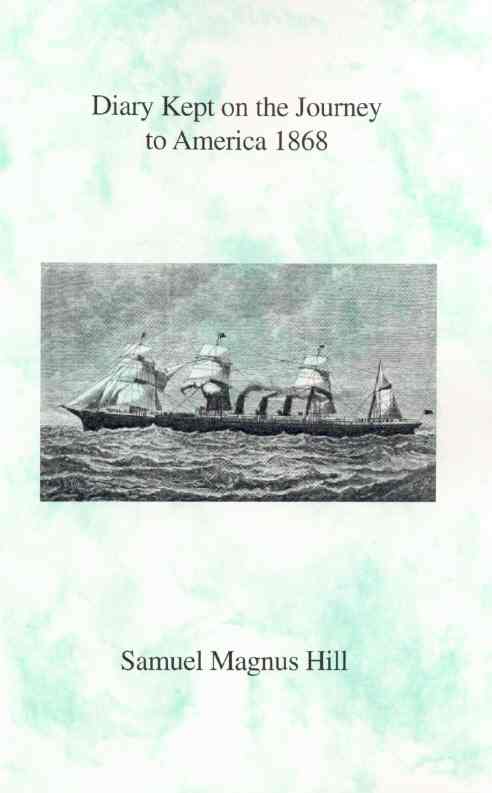
Excerpt from Hill’s Diary
Diary Kept on the Journey to America 1868
Samuel Magnus Hill
[Monday May] 4th
We left the place in the morning after being served plenty of food and drink, and many wished us well on our approaching journey. Since we only had one horse, father and I had to walk almost the entire way, and when we arrived in Eksjö we were tired. We got to rest briefly while the horses grazed. There a great group of emigrants met up and purchased various small things for the long trip ahead. Quite a few of them got drunk as they drank farewell toasts to their homeland. My paternal grandfather met us there too, because he had been called as a witness in a case in the magistrates’ court. We said farewell to each other, never to see him again in this life. God bless his grey hair!
After having prepared ourselves for our journey in this manner we continued on our way to Nässjö, the railway station nearest to Eksjö. As before, we had to continue on foot. And since the load had increased for most people, there were many who had to walk behind [their carts]. Some who had lingered a bit too long in town were in high spirits, and they traveled down the road in the wildest speed, continually using the whip on the poor animals, exhausting them, so that they would catch up with the others, or gain enough time for a stop to renew their intoxication, in case it had diminished.
In that manner we arrived in Nässjö in the evening and had our belongings weighed in and loaded up, ready for our departure to Gothenburg. For the first time I got to see a locomotive pulling train cars, and it was curious to me to observe its devices.
As there were quite a few people in Nässjö that night, there were no comfortable lodgings for us and we had to sleep on the floor in unheated rooms. There were about 100 of us from Västra Ryd alone, and quite a few from other areas, so we were about 500 individuals at the station travelling to America.
[Tuesday May] 5th
In the morning of the fifth our departure was at 8 o’clock, and we got up well ahead of that to make ourselves ready. And even though the innkeeper told us that we did not have to go to the waiting room until seven thirty, were got there an hour early. I think it was the worst hour of my life, because the room was so overcrowded that we were packed like sardines in tin and could not move. And I had my sick brother August to take care of, and I was busy the whole time pushing people away so that he would not be squeezed to death. The crowding was all the more dreary since the noise was deafening, some cried and prayed, others swore, and very few were calm, because they feared that the train would depart before they could board it. But finally the train arrived on the scheduled time, and we all got on after some trouble and shoving. Then off we went, first to Jönköping, where a number of emigrants waited to be united with us, and we were all in all 1600 traveling to Gothenburg, all of us emigrants to America. The train consisted of 150 cars when we arrived in Gothenburg. Terrible chaos erupted there, since some of the checked luggage had been left behind because the train had become too long. There were three locomotives pulling the train.
(Addition. We had more traveling companions than we had anticipated. My Uncle Johannes had come along to Eksjö to keep us company. But he was ahead of us in Jönköping and had traveled ahead to get out of the way. Kalle on Risön had done the same thing, as had Kalle in Modala, if I don’t remember wrong. The times were hard in Sweden, and quite a few ran away from wife and children. My Uncle Johannes had made an agreement with my aunt to leave, and she was to remain in Sweden. But after a few years she sold their home and followed after [to America]. They lived in Stanton where Uncle Gustav lived.)
On the trip between Nässjö and Gothenburg we got see many remarkable things in nature, some of them pretty, some of them stark. First we traveled through the forests and hills and hillsides of Småland, [and] among them some meadows and lakes. After that, in Västergötland, moorlands with sand and heather spread out in front of us. Down toward Falköping there were some small hills covered with deciduous forest cut through by a stream or a creek. Further down near Gothenburg high, barren rocky hillsides and hills rose up, and between them [there] were valleys filled with beautiful fields and meadows, and even a few lakes and streams meandering between the hills. Among them was the mighty Göta River, on which big ships rocked as far as the eye could see, so that the river appeared covered with masts.
The railroad also had to wind in and out between the hills, and sometimes inside them. One place was especially remarkable, because we had the sea on one side and a sky-high rock wall on the other. And there were so many curves that we could not see the end of our train.
After much trouble and unpleasantness we obtained lodging for the night in an inn, a beerhouse, on Köpmansgatan No. 2. There too it was so crowded that when we had lain down on the floor, we could barely turn around. Our spot was in the vestibule and it was quite cold.
[Wednesday May] 6th
I got up early in the morning to warm [myself] up by taking a stroll, and I walked down to the canal and the harbor, where the ships were. There I had the opportunity to see, for the first time, a ship with masts and rigging, and it was exactly as I had envisioned it from reading about it. Later in the day the left-behind luggage arrived. Money was exchanged and contracts for the journey were made with the company; we bought tickets and [since] we had made down payments we were assured of obtaining passage. A few small items were purchased, a little wine and Persian insect powder.
[Thursday May] 7th.
The day after that we went to see the sights of the city, among them the great bust of [King] Gustaf Adolf, who had founded the city. In the evening I was pretty tired, because I had to serve as a guide in the city, even though I had never been to Gothenburg before. There we met, completely unexpectedly, the son of our old neighbor, Kalle Hultin, who had left his parents without telling them where he had gone. He had been to sea, and he promised to write home so that they did not have to worry about him.
[Friday May] 8th.
Finally the day came for us to leave our dear homeland and meet our unknown fate. Already at an early hour everyone was up and around. And when everything had been put in order, we left the inn and walked down to the docks, where the ship was berthed, ready to receive its freight of people and goods. It was here that we ran into Karl Hultin. When our things had been stowed, we were also allowed to get on board and find the best place we could. The name of the ship was Cato, and it cast off from land at 5:45 PM.
An hour later we had lost sight of land; we had seen our homeland for the last time. Oh, what a sight! When the last trace [of land] had disappeared, we hurried below to arrange our sleeping accommodations and eat supper. Our bed was made on top of one of our trunks, in a strong draft, which, however, was better than in any other place, because we were on an elevated area of the ship, next to the stairs to the lower deck. It was good both because no water stayed there, and because we had our neighbors and friends all around. At the other end of the ship there were some people from Småland, and they made an awful row. I lost my wallet, which I had in my coat pocket.
